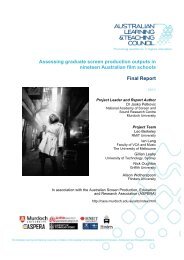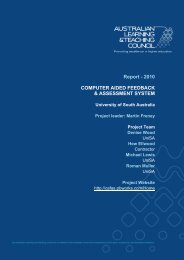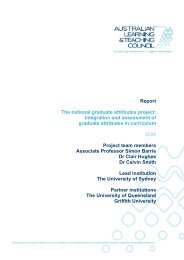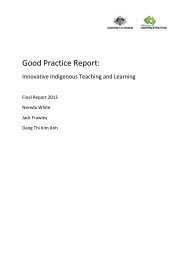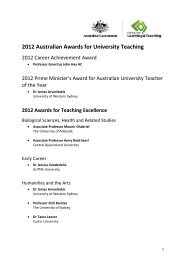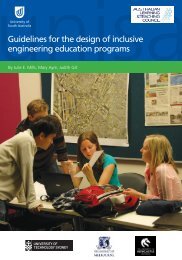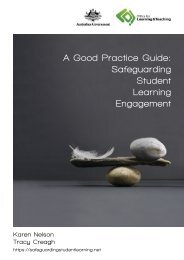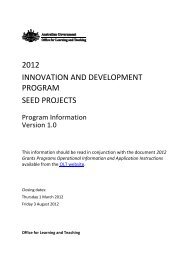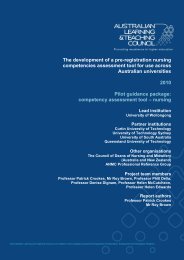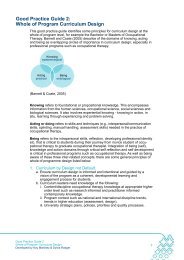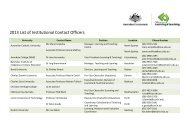national standards for psychological literacy and global citizenship
national standards for psychological literacy and global citizenship
national standards for psychological literacy and global citizenship
Create successful ePaper yourself
Turn your PDF publications into a flip-book with our unique Google optimized e-Paper software.
Executive Summary<br />
The primary aim of this Fellowship was to engage stakeholders in<br />
psychology education in a review of the aims of the<br />
undergraduate (UG) degree program, <strong>and</strong> subsequently the<br />
expected learning outcomes <strong>and</strong> curriculum content. There has<br />
been unprecedented <strong>national</strong> <strong>and</strong> inter<strong>national</strong> change in<br />
psychology education <strong>and</strong> training, as well as higher education<br />
(HE) more generally. The key issues are: (a) large numbers of<br />
graduates of psychology major programs in Australia do not go on<br />
to further professional training in psychology, <strong>and</strong> (b) there is an<br />
increasingly recognised need <strong>for</strong> professionals <strong>and</strong> citizens with<br />
high levels of <strong>psychological</strong> <strong>literacy</strong> <strong>and</strong> <strong>global</strong> <strong>citizenship</strong>.<br />
This Fellowship built on the outcomes of Cranney’s previous ALTC Associate Fellowship, in<br />
particular the delineation of six graduate attributes (GAs) <strong>for</strong> the Australian UG psychology<br />
program (knowledge, research, critical thinking, values, communication, application). The<br />
current initiative undertook further scholarly development of the concepts of <strong>psychological</strong><br />
<strong>literacy</strong> <strong>and</strong> <strong>global</strong> <strong>citizenship</strong>, as well as the identification <strong>and</strong> implementation of strategies<br />
<strong>for</strong> translating these concepts into practice within the classroom. Psychological <strong>literacy</strong> can<br />
be conceptualised as the general capacity to adaptively <strong>and</strong> intentionally apply psychology<br />
to meet personal, professional <strong>and</strong> societal needs. Global <strong>citizenship</strong> is the underst<strong>and</strong>ing of<br />
<strong>global</strong> interrelatedness, <strong>and</strong> the capacity to live, work <strong>and</strong> contribute positively as a member<br />
of <strong>global</strong> communities. These concepts were central to developing the pedagogy underlying<br />
the creation <strong>and</strong> revision of the <strong>st<strong>and</strong>ards</strong> <strong>for</strong> <strong>psychological</strong> <strong>literacy</strong> <strong>and</strong> <strong>global</strong> <strong>citizenship</strong>.<br />
This work was undertaken within the context of (a) building, supporting <strong>and</strong> collaborating<br />
with networks of students, graduates, employers, <strong>and</strong> educators (<strong>national</strong>, inter<strong>national</strong> <strong>and</strong><br />
transdisciplinary), as well as (b) contributing <strong>and</strong> responding to peak <strong>national</strong> disciplinary<br />
<strong>and</strong> professional bodies. Specifically, the aims of this Fellowship were to:<br />
1. Further develop academic <strong>st<strong>and</strong>ards</strong> <strong>for</strong> <strong>psychological</strong> <strong>literacy</strong> <strong>and</strong> <strong>global</strong> <strong>citizenship</strong>;<br />
2. Further develop a <strong>for</strong>ward-looking, responsible, <strong>and</strong> evidence-based pedagogy <strong>for</strong><br />
UG psychology, to guide curriculum renewal <strong>and</strong> the achievement of Aim 1;<br />
3. Further develop networks of psychology educators <strong>and</strong> other stakeholders, to<br />
facilitate input to <strong>and</strong> engagement with the academic <strong>st<strong>and</strong>ards</strong> <strong>and</strong> pedagogy aims<br />
of this initiative;<br />
4. Couch these activities in continued two-way interaction with relevant inter<strong>national</strong><br />
<strong>and</strong> interdisciplinary bodies.<br />
These aims were largely met, <strong>and</strong> a comprehensive list of outcomes can be found in this<br />
report, as well as at www.<strong>psychological</strong><strong>literacy</strong>.com. Key overall outcomes include:<br />
1. Substantial contributions to <strong>national</strong> <strong>and</strong> inter<strong>national</strong> meetings/<strong>for</strong>ums <strong>and</strong><br />
educator networks, with a focus on the operationalization, adoption <strong>and</strong><br />
implementation of <strong>psychological</strong> <strong>literacy</strong>, GAs, associated student learning outcomes<br />
(SLOs), <strong>and</strong> St<strong>and</strong>ards.<br />
2. Further network-based development, revision <strong>and</strong> implementation of:<br />
(a) <strong>psychological</strong> <strong>literacy</strong> as the primary outcome of UG education, (b) the GAs <strong>and</strong><br />
SLOs as the basis <strong>for</strong> <strong>st<strong>and</strong>ards</strong> (threshold learning outcomes [TLOs]) of accreditation<br />
NATIONAL STANDARDS FOR PSYCHOLOGICAL LITERACY AND GLOBAL CITIZENSHIP<br />
iv



